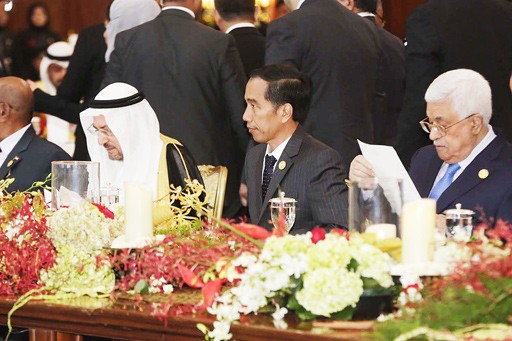Popular Reads
Top Results
Can't find what you're looking for?
View all search resultsPopular Reads
Top Results
Can't find what you're looking for?
View all search resultsThe cost of Indonesia’s vote
For the nation’s guardians of the Constitution, the chance to play honest broker with Israel is too much a cost, and this knowledge has been passed down until this day.
Change text size
Gift Premium Articles
to Anyone
 President Joko “Jokowi” Widodo (center) along with Palestinian President Mahmoud Abbas (right), OIC Secretary-General Iyad Ameen Madani (left), and several heads of state and government attend the dinner of the 5th Extraordinary OIC Summit on Palestine and Al-Quds Al-Sharif in Jakarta on 7 March, 2016. (JP/Wendra Ajistyatama)
President Joko “Jokowi” Widodo (center) along with Palestinian President Mahmoud Abbas (right), OIC Secretary-General Iyad Ameen Madani (left), and several heads of state and government attend the dinner of the 5th Extraordinary OIC Summit on Palestine and Al-Quds Al-Sharif in Jakarta on 7 March, 2016. (JP/Wendra Ajistyatama)
E
very year, the United Nations General Assembly (UNGA) draws in the world’s leaders to New York to say their piece about the state of the world and how their national interests are being represented. This year, which marks 75 years since the beginning of the UN’s journey and the flourishing of its postwar ideals, offers a very different view of the world, for various obvious reasons.
On the one hand, the pandemic has pushed us to shelter in place and become wary of our own governments, and even one another. In another instance, most of our activities have moved online, and for the very first time, even the UNGA will be carried out as a largely virtual summit.
One thing that has remained constant even after 75 years is the endless struggle of the Palestinians in their pursuit of independence. And yet, from the terrain to the roadblocks and the changing of the guards, the challenges that emerged this year could not have made it more difficult for countries to maintain the Israel vs. Palestine dichotomy.
For Indonesia, never has it been harder to determine how to best support the Palestinian cause, when even one of its biggest economic partners, the United Arab Emirates, has seemingly taken up the economic opportunities offered in the United States’ so-called Middle East peace plan, in exchange for normalized ties with Israel.
Some observers have likened this move to a betrayal of the 2002 Arab Peace Initiative, an agreement to force Israel to forfeit its occupation of Palestinian territory in exchange for establishing ties with Arab nations.
In private, Abu Dhabi may say it is cultivating ties to get some leverage from Israel, while stauncher supporters of Palestine like Indonesia may continue to take a hardened position against the Jewish state.
Jakarta has already signaled that it won’t shift its position any time soon. Israel has for decades tried to get Indonesia to open diplomatic ties with it. As home to the largest Muslim population in the world, a formal recognition of Israel by Indonesia would amount to its de jure rule over Jerusalem.
Most if not all of Indonesia’s previous top diplomats have argued that recognizing Israel would come at the huge moral cost of abandoning the only country that has yet to gain independence from its colonial master.
For the nation’s guardians of the Constitution, the chance to play honest broker with Israel is too much a cost, and this knowledge has been passed down until this day.
For President Joko “Jokowi” Widodo, or any future Indonesian leader, for that matter, the issue of Palestine has always been about accommodating Muslim interests – an issue that unites the entire Muslim ummah as a single voting bloc is a luxury that any leader would be lucky to have.
Whatever the people in government decide, Jokowi will have a grand opportunity to remind people about the struggles that have eluded an entire marginalized group of people for 75 years. And since his appearance at the UNGA is past due a couple of years, he might as well strike a winning shot.








